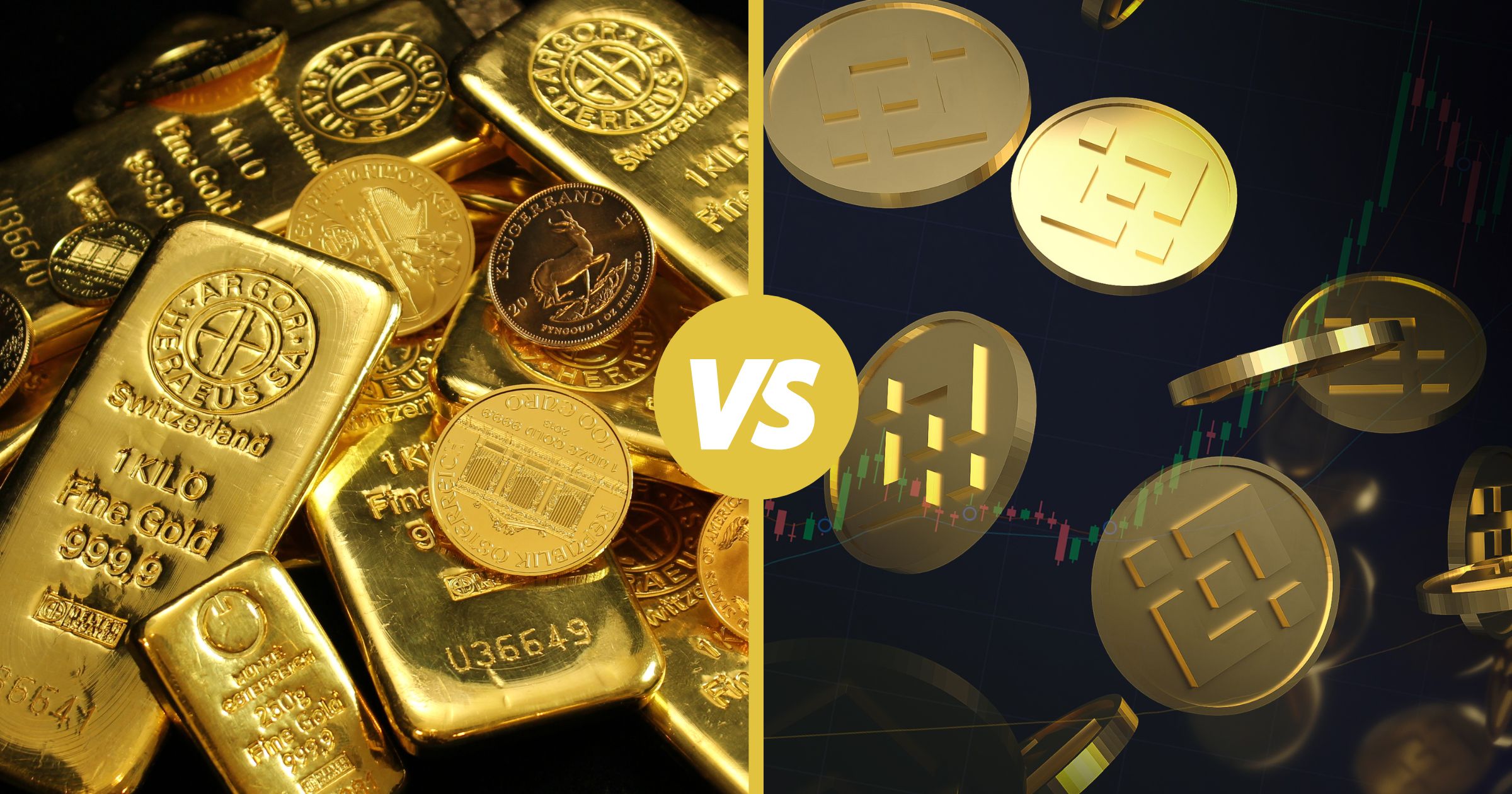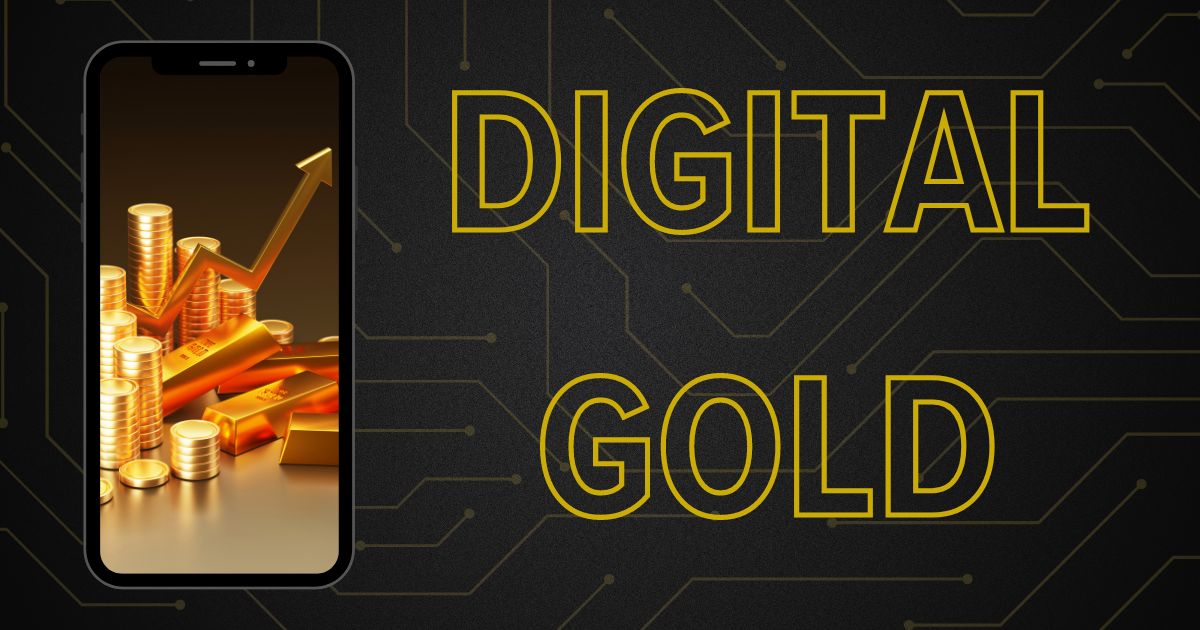Digital Gold vs. Physical Gold: A Comprehensive Guide

Gold has been a sought-after investment and store of value for centuries, whether in physical or digital form. In recent times, there has been a rise in investors' interest in digital gold as an alternative to traditional physical gold.
This guide seeks to provide an overview of the key differences between digital gold and physical gold. It will discuss form, price, purity, storage, transaction costs, risks, liquidity, taxes, accessibility and more. The aim is to help investors make an informed decision between digital gold vs physical gold based on their unique needs and risk appetite.
What is Digital Gold?
Digital gold refers to gold that exists in digital form rather than physical possession. To understand digital gold, it is important to first understand digital gold's meaning and definition. Digital gold is a digital asset where ownership of physical gold is recorded electronically on distributed ledgers such as blockchain.
It allows investors to purchase, sell and trade specific amounts of gold electronically without having physical possession of gold bullion, bars or coins. The digital gold definition essentially means that the title to physical gold is acquired virtually through an online platform or exchange instead of holding the physical commodity itself.
What is Physical Gold?
Physical gold refers to gold in its tangible and observable forms such as gold coins and gold bars. Gold bullion generally describes gold in bulk form, without numismatic value, that is valued by its gold content and is often cast into gold bars. Gold coins are physical coins made of gold or an alloy containing gold that are issued and circulated as legal tender by governments.
Meanwhile, gold bars are solid rectangular forms of gold that have been poured and stamped with the metal's fineness, weight and identification marks. Holding physical gold provides the investor with direct ownership of the actual commodity as an asset, unlike digital gold which represents title to an underlying holding of physical gold.
Digital Gold vs. Physical Gold
Understanding how key differences may better align with an investor's needs, risk tolerance, budget and investment goals is crucial to determining which offers the optimal solution between digital gold and physical gold. The following sections will dive deeper into these contrasting dimensions to facilitate a well-informed comparison.
| Aspect | Physical Gold | Digital Gold |
| Form | Tangible forms such as bars, coins or bullion can be held in one's direct possession. | Intangible and its ownership exist solely in digital records on online platforms without any physical holding. |
| Price | Impacted by supply and demand forces in the global market for the commodity itself, along with production and material costs. | Tied to an underlying Reference Price which tracks the performance of physical gold but has minor deviations depending on liquidity factors. |
| Purity | Standardised purity grades of 99.5% or 99.99% pure are hallmarks of products from reputable refineries. | Representations of gold ownership that do not face the same tangible constraints. |
| Storage | Requires managing private vaulting, secure safe deposits or using professionally managed storage facilities which levy additional handling fees. | Liability for secure and insured storage on behalf of investors provides more easy access and avoids responsibility for private on-site security. |
| Transaction Costs | Buying and selling physical gold coins, bars or bullion involves additional expenditures such as delivery and storage charges from dealers when making a purchase. | Allow buying and selling online through fund transfers, potentially avoiding physical delivery costs and offering transactional convenience. |
| Risks | Stored within one's direct custody or at professional vaulting facilities are at risk of extrinsic perils like theft, loss, or damage. | Exposed to operational, counterparty and cybersecurity risks from relying on centralised platforms for custody, transactions and record-keeping. |
| Liquidity | Relatively easily sold back to dealers for cash, though premium markups may apply on repurchase. | Held through online platforms has nearly instantaneous liquidity as trades settle quickly via banking transfers or closed-ledger bookkeeping. |
| Taxes | Long-term capital gains tax rates apply on profits from physical gold held over one year. | Short-term capital gains tax rates due to frequent buy-sell activities being seen as securities by regulators. |
| Accessibility | Held through online platforms, it has nearly instantaneous liquidity as trades settle quickly via banking transfers or closed-ledger bookkeeping. | Digital gold platforms allow investors near 24/7 access to their holdings through mobile and online trading interfaces. |
| Investing Golas | Physical gold appeals most to goals of long-term storage of value, wealth preservation and portfolio diversification | Requires interfacing with local dealers during business hours or shipping precious metals internationally, which incurs delays. |
Conclusion
In summary, this comparative analysis has evaluated the major variances between physically held gold products and their digital equivalents available through trading platforms. While both provide exposure to gold prices and its portfolio diversification benefits, their implications diverge meaningfully across key attributes such as storage, taxes, liquidity and costs.
For investors prioritizing direct ownership, and insurance against monetary debasement or privacy, physical bullion remains preferable. However, those seeking convenience, low fees or leveraged trading may find digital gold venues outperform physical alternatives across specific goals and scenarios.
FAQs
Is Digital Gold Safe?
Reputable digital gold platforms have instituted robust security infrastructure and safeguards to bolster investor protection. Strict storage vaulting, insurance of reserves, multi-signature controls and regular third-party attestations aim to engender trust in the integrity and resilience of platforms.
Government-backed deposit insurance further assures against rare liquidation scenarios. Importantly, avoiding physical transportation exposures eliminates security hazards faced with bullion. While no investment is entirely without risk, leading digital gold firms have instituted defensive measures to make holdings as legally secure as possible given current technologies.
Should I Buy Physical Gold or Digital Gold in 2024?
Physical gold appeals most to those seeking a hard asset to hedge against monetary instability or diversify a crisis-resistant portfolio. The direct ownership experience assuages privacy concerns and intermediary dependence.
However, digital gold unlocks greater transactional fluidity, lowers costs and frees capital otherwise locked in bullion storage—particularly valuable for those pursuing leveraged trading plays. Meanwhile, accredited investors may access digital gold yield programs generating interest returns not feasible with physical holdings.
Where I Can Buy Digital Gold in Australia?
There are several reputable platforms Aussie investors can utilize to purchase digital gold exposure. Two leading exchanges for Australian buyers are Kinesis Money and BullionVault.
Both allow the creation of allocated gold-backed accounts online. Exploring available options empowers finding the best solution for Australian digital gold requirements and risk profiles.
Are There any Alternative Gold Investment Options?
While physical bullion and digital gold exchanges offer straightforward access to the gold market, some alternative investment routes also provide exposure.
- Gold mining stock funds and equities provide leveraged plays on metal prices while generating shareholder returns.
- Gold ETFs like GLD allow fractional physical ownership through a brokerage account. Gold futures contracts traded on commodity exchanges introduce leverage and shorting potential for experienced traders.
- Sovereign gold bonds from governments provide capital protections with interest earned on gold’s value.
- Gold savings accounts allow title ownership or enable purchasing small allocated amounts over time.
Categories
Latest Posts
-

Digital Gold vs. Physical Gold: A Comprehensive Guide
March 1, 2024 -

How is Gold Mined in Australia: A Deep Dive into the Extraction Process
February 21, 2024 -

How To Get The Most Money For Your Gold Jewellery
February 15, 2024 -

Beginner’s Guide on How To Sell Silver in Australia
February 7, 2024 -

How To Invest in Silver in Australia For 2024?
January 31, 2024 -

How Gold is Tested? All You Need To Know
January 25, 2024 -

Gold Bullion and SMSF – All You Need To Know
January 19, 2024 -

Cast Bars vs Minted Bars – Clear Comparison
January 10, 2024 -

What is Platinum?
January 2, 2024 -

How To Invest in Gold ETF
December 21, 2023 -

The Largest Gold Nuggets Ever Found
December 18, 2023 -

What is Digital Gold and How Does it Work?
December 13, 2023 -

Best Ways To Invest in Gold in Australia
December 7, 2023 -

How Much Gold is There in the World?
November 29, 2023 -

Where and How To Store Gold and Silver?
November 23, 2023 -

The Relationship Between Gold and Inflation Over the Australian History
November 16, 2023 -

How Does Gold Refining Work?
November 9, 2023 -

Gold Bars vs Gold Coins: What Should You Buy?
November 1, 2023 -

Know The Cheapest Way To Buy Gold
October 25, 2023 -

Why Invest in Gold? Top Reasons to Consider
October 18, 2023 -

How Much Gold Can You Buy Without Reporting in Australia?
October 15, 2023 -

The Best ASX Gold Stocks in Australia For 2023
October 9, 2023 -

Top 10 Australian Gold Mining Companies in 2023
October 5, 2023 -

How to Sell Jewellery in Australia?
October 4, 2023
 07 4939 0239
07 4939 0239